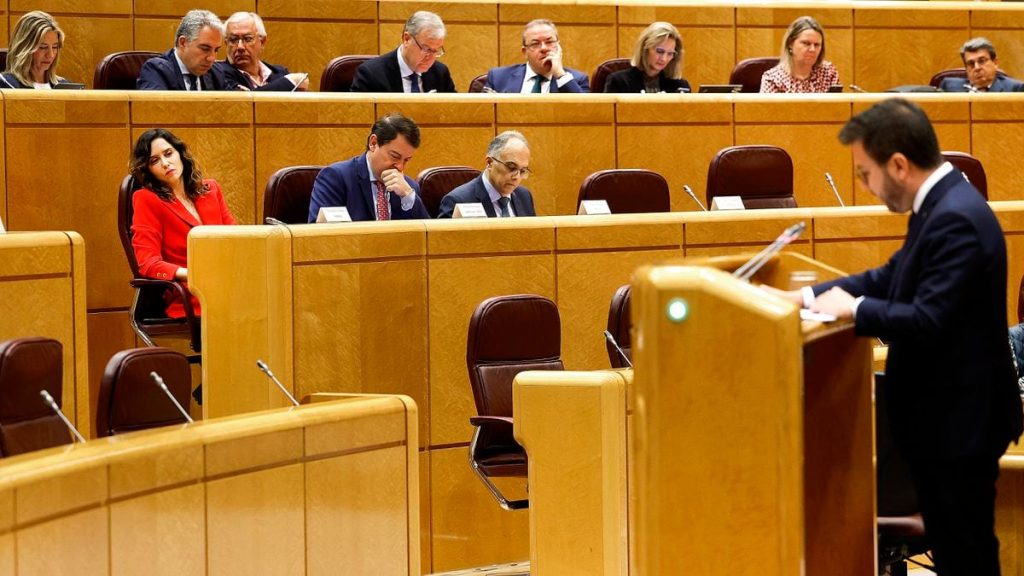Pere Aragonès announced that he would go to the Senate to “troll” the PP, but it was actually the government and PSOE who were trolled. The president of the Generalitat appeared as the only guest not invited to the event organized by the Popular Party on Monday, in a new episode of institutional agitation in the upper house against the future amnesty law. Aragonès brought his campaign as ERC candidate in the upcoming regional elections on May 12, where he will not be facing an irrelevant PP in Catalonia, but a favorite PSC according to all polls. The president’s trolling was actually aimed at the real electoral opponent, much to the delight of the popular party, who found the perfect fuel for their discourse. Aragonès evoked the times when Pedro Sánchez and his leaders promised that there would never be an amnesty, predicting that they will have to swallow their solemn promise that there will never be a self-determination referendum.
The Senate, a nearly invisible chamber until recently, has been making headlines every week since the PP gained an absolute majority. The populares have dug a trench against the government there, including reprimands of ministers and a series of ceremonies to amplify their complete rejection of the amnesty bill, before sending it back to the Congress for final approval. The populares are trying to convey the message that the true representation of the people now resides in the Senate. Their own leader, Alberto Núñez Feijóo, had hinted at this, and senator Antonio Silván reiterated at the start of Monday’s debate that “in the lower house ‘the fugitive’ [Carles] Puigdemont rules,” while in the upper house it is the PP, which “represents the majority of Spaniards.”
The PP repeated on Monday the move they had tried last October: summoning regional presidents―11 out of 17 from their own ranks―to the General Commission of the Autonomous Regions to speak against the amnesty. This time they also aimed to approve a report against the supposed “regional content” of the legislative project. Just like before, Aragonès was the only president from another party who attended the meeting. However, even among the popular barons, there didn’t seem to be much enthusiasm: only six attended, with notable absences such as Juanma Moreno from Andalusia or Alfonso Rueda from Galicia. Facing the array of popular regional leaders, Aragonès opened fire by reaffirming the referendum, criticized the socialist candidate Salvador Illa, and proclaimed that the one who best understood the meaning of the amnesty was José María Aznar.
The popular barons had an easy time joining in the prediction that Sánchez will eventually give in to the self-determination referendum. Isabel Díaz Ayuso was the most anticipated, and she stayed less energetic than usual, sticking closely to her prepared speech. In her opening sentence, the Madrid president called the independence movement “criminals.” She then lamented that while the focus was on the amnesty, other important issues such as Spain’s position in the new world order, the future of the youth, and artificial intelligence were being ignored. She insisted that the law is a “blow to democracy,” accused the independence movement of living off the sweat of all Spaniards, and made cryptic references to the use of co-official languages.
The popular barons didn’t contribute much to the discussion on the “regional content” of the amnesty in the approved report. The senators criticized demands for unique funding and the forgiveness of Catalan debt, issues unrelated to the bill. They emphasized the potential negative effects of the amnesty on the autonomy of the regions. Finally, the socialist senators responded, accusing the PP of using the Commission for matters that do not concern them. Overall, the session ended with the socialists downplaying Aragonès’ statements and making it clear that they will not support a self-determination referendum or unique funding. In the end, the PP did not feel trolled at all.


